
Infectious Disease Modelling
Scope & Guideline
Innovating Health Policy with Data-Driven Disease Modeling
Introduction
Aims and Scopes
- Mathematical and Statistical Modeling:
The journal focuses on the development and application of mathematical models to understand and predict the dynamics of infectious diseases. This includes various compartmental models (e.g., SIR, SEIR) and statistical techniques that assess disease spread and control interventions. - Epidemiological Analysis:
Research published in the journal involves in-depth epidemiological analyses that investigate patterns of disease incidence, prevalence, and transmission dynamics across different populations and regions. - Impact Assessment of Interventions:
A significant aspect of the journal's scope is evaluating the effectiveness of public health interventions, such as vaccination campaigns, social distancing measures, and quarantine strategies, using modeling frameworks. - Emerging Infectious Diseases:
The journal addresses modeling challenges associated with emerging and re-emerging infectious diseases, contributing to preparedness and response strategies for global health threats. - Data-Driven Approaches:
There is a strong emphasis on incorporating real-world data into models, enhancing the predictive power and applicability of research findings to inform public health policy and decision-making. - Spatial and Temporal Dynamics:
Research often explores the spatial and temporal aspects of disease transmission, utilizing geographic information systems (GIS) and spatiotemporal modeling techniques to understand how diseases spread across different environments.
Trending and Emerging
- COVID-19 Modeling:
The COVID-19 pandemic has catalyzed an explosion of research focused on modeling its transmission dynamics, vaccination strategies, and public health interventions. This trend showcases the journal's adaptability to urgent global health crises. - Machine Learning and AI Integration:
There is an increasing integration of machine learning and artificial intelligence techniques in modeling infectious diseases, enhancing predictive accuracy and enabling the analysis of large datasets. - Behavioral Dynamics in Disease Spread:
Research is increasingly exploring the impact of human behavior on disease transmission, incorporating social dynamics and compliance with public health measures into modeling frameworks. - Network Theory Applications:
The application of network theory to understand the spread of infectious diseases is gaining traction. Studies are focusing on the role of social networks, mobility patterns, and connectivity in transmission dynamics. - Climate and Environmental Influences:
Emerging studies are examining the effects of climate change and environmental factors on the spread of infectious diseases, highlighting the need for models that consider ecological and climatic variables. - Multi-Pathogen Interactions:
Research is trending towards understanding interactions between multiple pathogens and their collective impact on disease dynamics, reflecting a more holistic approach to infectious disease modeling.
Declining or Waning
- Traditional Compartmental Models:
While compartmental models such as SIR and SEIR have been foundational in infectious disease modeling, there seems to be a waning interest in purely classical approaches. Researchers are increasingly seeking more complex models that incorporate behavioral dynamics, environmental factors, and heterogeneous populations. - Single-Disease Focus:
There is a noticeable decrease in studies focusing solely on single infectious diseases. Instead, there is a growing trend towards integrative models that consider co-infections and the interplay between multiple diseases, reflecting the complexities of real-world epidemiology. - Static Models:
The reliance on static models is declining as researchers prioritize dynamic, time-dependent modeling approaches that can capture the evolving nature of infectious disease transmission and control over time. - Local Data Analysis:
Research that focuses exclusively on localized data without considering broader epidemiological trends or global implications is becoming less common. There is a shift towards studies that incorporate multi-regional or global perspectives.
Similar Journals
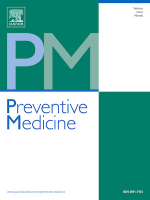
Preventive Medicine
Fostering evidence-based practices in preventive medicine.Preventive Medicine is a premier academic journal published by Academic Press Inc Elsevier Science, renowned for its influential contributions to the fields of Epidemiology and Public Health. Since its inception in 1946 and through its dedicated issues leading into 2024, the journal has established itself as a leading platform for cutting-edge research, boasting impressive Scopus rankings, with a notable Q1 status across relevant categories. This journal provides an essential forum for scholars, practitioners, and policy-makers interested in the prevention of diseases and the promotion of health within populations. With each issue, it disseminates valuable insights on preventive strategies, health behaviors, and epidemiological trends, making it crucial for anyone invested in the advancement of public health sciences. The journal does not offer open access options, ensuring that content remains relevant and targeted to its scholarly audience. Given its valuable contributions and recognition in the academic community, Preventive Medicine continues to play a pivotal role in shaping evidence-based approaches to health promotion and disease prevention in modern societal contexts.
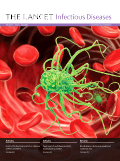
LANCET INFECTIOUS DISEASES
Transforming Knowledge into Public Health SolutionsLANCET INFECTIOUS DISEASES is a premier journal published by Elsevier Science Ltd, dedicated to disseminating high-quality research and comprehensive reviews in the field of infectious diseases. Since its inception in 2001, the journal has become a pivotal resource in the medical community, recognized for its rigorous peer-review process and impactful contributions to public health. With an impressive Scopus rank of #2 out of 344 in the category of Medicine - Infectious Diseases, it consistently ranks in the 99th percentile, highlighting its importance and influence in shaping clinical and epidemiological research. The journal's commitment to advancing knowledge in infectious diseases is underscored by its Q1 quartile designation in 2023, affirming its status as a leading academic outlet. Although not an open-access journal, LANCET INFECTIOUS DISEASES provides essential insights for researchers, healthcare professionals, and students, bridging the gap between cutting-edge research and practical application in an increasingly interconnected world.
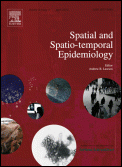
Spatial and Spatio-Temporal Epidemiology
Unraveling Disease Patterns Across Time and SpaceSpatial and Spatio-Temporal Epidemiology is a premier journal dedicated to advancing the understanding of spatial patterns and temporal dynamics in epidemiological research. Published by ELSEVIER SCI LTD in the United Kingdom, this journal utilizes a robust interdisciplinary approach, blending methodologies from epidemiology, geography, and environmental science. With an impressive impact factor and categorized in the top quartiles for its fields—Q2 in Epidemiology and Q1 in Geography, Planning and Development (2023)—this journal excels in providing high-quality insights relevant to both academic researchers and public health professionals. The journal supports open access options, enhancing the dissemination and impact of scholarly articles. Since its inception in 2009, Spatial and Spatio-Temporal Epidemiology has published a myriad of studies that contribute significantly to understanding the geographical and temporal aspects of diseases, thereby serving as a crucial resource for anyone invested in improving public health outcomes and addressing infectious diseases globally.

Tropical Medicine and Infectious Disease
Advancing global health through tropical insights.Tropical Medicine and Infectious Disease, published by MDPI, is a leading peer-reviewed journal dedicated to advancing the field of tropical medicine and infectious diseases. With an open access model established since 2016, this journal fosters a collaborative environment for researchers, professionals, and students from around the world to disseminate cutting-edge findings and innovative approaches to public health challenges, particularly in tropical regions. The journal has earned recognition, achieving a Q2 quartile ranking in notable fields including Immunology and Microbiology, Infectious Diseases, and Public Health, Environmental, and Occupational Health in 2023, indicative of its influence and relevance in the scientific community. With a focus on high-quality research, Tropical Medicine and Infectious Disease aims to bridge the gap between basic science and clinical application, providing invaluable insights critical for combating infectious diseases and improving health outcomes in vulnerable populations. The journal’s accessibility and substantial indexing in major databases further solidify its importance as a key platform for impactful research in this essential field.

Current Tropical Medicine Reports
Advancing knowledge in tropical health.Current Tropical Medicine Reports, published by Springer, is an esteemed journal that serves as a pivotal platform for researchers, professionals, and students in the fields of immunology, allergy, and infectious diseases. With a strong focus on emerging tropical medicine topics, the journal provides an authoritative avenue for disseminating innovative research and practical insights, showcasing its commitment to advancing global health knowledge. Now in its convergence years from 2014 to 2024, it has successfully established itself in the academic community, evidenced by its Q2 rankings in the categories of Infectious Diseases and Immunology and Allergy in 2023, reflecting its impact and relevance. The journal boasts impressive Scopus rankings, holding the 50th position in Infectious Diseases and 55th in Immunology and Allergy, further underscoring its significance in these critical fields. While it operates under a subscription model, the journal serves not only as a resource for published research but also as a catalyst for collaboration and knowledge exchange among the scientific community. With a growing readership, Current Tropical Medicine Reports is poised to continue shaping the discourse surrounding tropical health challenges.
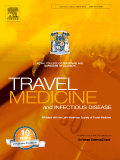
Travel Medicine and Infectious Disease
Uncovering the science behind safe travels.Travel Medicine and Infectious Disease is a premier peer-reviewed journal published by Elsevier Science Ltd, dedicated to advancing the field of travel medicine and infectious disease research. With an impressive impact factor and a category ranking of Q1 in both Infectious Diseases and Public Health, Environmental and Occupational Health, this journal is recognized as a leading source of high-quality research and insights. Originating in 2003 and transitioning to an Open Access model in 2023, it aims to disseminate critical findings that enhance the understanding of health risks associated with travel, vaccination strategies, and infectious disease outbreaks. The journal’s Scopus rankings reflect its influence, with a rank of 7/665 in Public Health and 20/344 in Infectious Diseases. Researchers, healthcare professionals, and students will find this journal invaluable for staying informed on the latest trends and developments in travel-related health challenges.

Journal of Biological Dynamics
Illuminating the pathways of ecological evolution and behavior.The Journal of Biological Dynamics is a pivotal open access publication, established in 2007 and published by Taylor & Francis Ltd, that caters to a broad field of inquiry within Ecology, Evolution, Behavior, and Systematics. With an ISSN of 1751-3758 and an E-ISSN of 1751-3766, this journal has garnered a respectable reputation, securing a Q2 ranking in both its primary categories according to the 2023 metrics. The journal aims to disseminate high-quality research that stimulates dialogue among ecological scientists, practitioners, and students while providing insightful analysis on biological dynamics. As part of its commitment to accessibility, it has been an open access publication since 2012, allowing free access to its rich repository of knowledge. Hailing from the United Kingdom, this journal not only provides a platform for original research but also contributes significantly to advancing ecological understanding through its innovative approach.
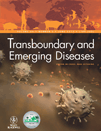
Transboundary and Emerging Diseases
Empowering knowledge sharing in veterinary and medical sciences.Welcome to Transboundary and Emerging Diseases, a prestigious journal published by WILEY-HINDAWI. With its ISSN of 1865-1674 and E-ISSN of 1865-1682, this journal plays a pivotal role in the dissemination of high-quality research within the fields of Immunology, Microbiology, Medicine, and Veterinary Sciences. Based in the United Kingdom, this open-access journal stands out with a remarkable impact factor, reflecting its category quartiles in 2023, where it secured Q1 rankings across multiple disciplines, including a remarkable rank of #3 out of 194 in Veterinary General, placing it in the top 2% of its field. With coverage spanning from 2008 to 2024, Transboundary and Emerging Diseases provides a vital platform for researchers, professionals, and students to explore emerging threats to global health and animal welfare. The journal's commitment to open access ensures broad availability of cutting-edge research, fostering collaboration and knowledge sharing in pursuit of innovative solutions to transboundary diseases. Join a community dedicated to advancing the science and practice within this crucial area of study.
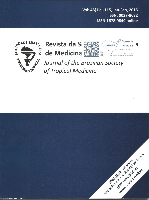
Revista da Sociedade Brasileira de Medicina Tropical
Championing open access to vital health research.Revista da Sociedade Brasileira de Medicina Tropical is a distinguished open-access journal published by the Sociedade Brasileira de Medicina Tropical, focusing on the critical fields of Infectious Diseases, Microbiology, and Parasitology. Since its inception in 1972, this journal has committed to disseminating impactful research that addresses pressing global health challenges, particularly in tropical and infectious diseases prevalent in Brazil and beyond. With a robust publication history, it has been recognized as a Q3 journal in esteemed categories, reflecting its valuable contributions to scientific literature and its ranking in various Scopus categories, including a notable position in Parasitology. Researchers, professionals, and students are encouraged to engage with its rich repository of research, which has been freely accessible since 1997, fostering a wide-reaching impact on public health strategy and scientific innovation.
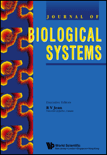
JOURNAL OF BIOLOGICAL SYSTEMS
Elevating the discourse on biological systems and their applications.Journal of Biological Systems is a prestigious journal published by World Scientific Publishing Co. Pte Ltd that serves as a vital platform for interdisciplinary research in the domains of agricultural and biological sciences, applied mathematics, and ecology. With its inception in 1996 and converging insightful contributions up to the present, the journal showcases innovative research that influences both theoretical and practical aspects within these critical fields. Its commendable Q2 category rankings in 2023 highlight its commitment to high-quality scholarship, achieving rankings of #62 in Agricultural and Biological Sciences, #243 in Applied Mathematics, and #204 in Ecology on the respected Scopus index. While the journal maintains a traditional publishing model, its rigorous peer-review process ensures that it meets the highest academic standards. The Journal of Biological Systems is essential reading for researchers, professionals, and students keen to keep abreast of the latest developments and methodologies impacting ecological systems, mathematical applications, and biological innovations.